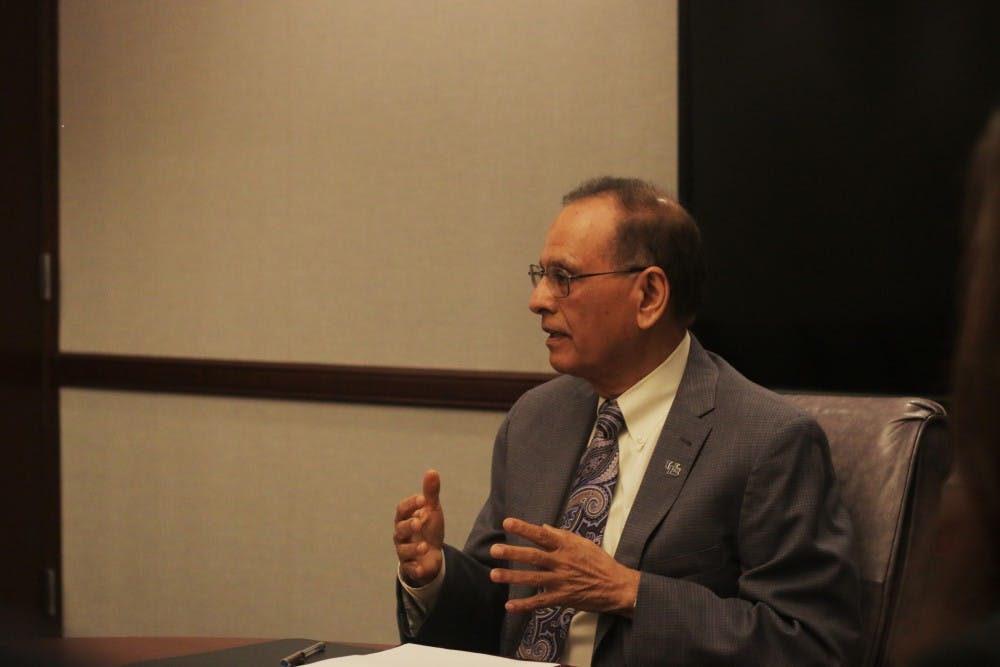UB President Satish Tripathi signed and announced his support for a Faculty Senate resolution protecting non-citizen members of the UB community from any legislation passed by the Trump administration.
The resolution, signed on Nov. 9, will allow these students, faculty and staff to remain on campus to continue their studies or employment despite executive orders signed by U.S. President Donald Trump.
Trump’s signing of Executive Orders 13769 and 13780 “Protecting the Nation from Foreign Terrorist Entry into the United States” in January and March 2017 posed a threat to UB community members, especially those from Iran, Libya, Somalia, Sudan, Syria and Yemen.
The resolution states that 122 students were affected by the order during the 2017 spring semester. The Spectrum reached out to the Office of International Education for an updated number of affected students but did not hear back in time for publication.
UB’s support of its non-citizen community members is nothing new.
In a Jan. 30, 2017 letter to the University Community titled “UB Monitoring Executive Orders,” Tripathi wrote “University Police does not and shall not routinely inquire about an individual's immigration status and will not make inquiries into the immigration status of students, faculty, staff or our visitors unless there has been an arrest.”
And on Nov. 12, 2016, Gov. Andrew Cuomo issued a statement calling New York a “refuge” for immigrants. On Jan. 21, 2017, the University Faculty Senate endorsed a petition to make all SUNY locations “sanctuary campuses.” Cuomo also promised pro bono immigration legal services for non-citizens in the state.
The resolution reaffirms UB’s core values as an accepting campus that is a safe place for international students and their families, according to Faculty Senate chair Philip Glick. He said despite actions the Trump administration takes to target this demographic, the university will protect its students, staff and faculty.
“President Trump continues to use this xenophobic rhetoric, and although he hasn't acted on the DACA stuff yet, he certainly has tried to challenge it,” Glick said. “I believe Trump’s DACA challenges are making it up through the Federal Appeals Court now and I suspect by this end of the session of the Supreme Court, there will be some sort of challenge to DACA.”
In a statement from the university, spokesperson Kate McKenna wrote that it’s UB’s mission to provide a safe learning and work environment for all members of the UB community. She wrote that UB is a welcoming campus for students, faculty and visitors from across the globe and the ideals in the senate’s resolution advance the university’s commitment to uphold and protect these values.
“The diversity and global perspectives and experiences of university community members who have come to the U.S. from around the world are among UB’s most important institutional strengths,” McKenna wrote in an email. “UB’s international community contributes greatly to the university’s research and education, enhances the diversity of our community, and the richness of UB’s cultural and intellectual life.”
Glick said he hopes other universities will look at UB’s actions and mimic them on their own campuses.
“The 2016 presidential election was the beginning of people saying that they were not happy with what’s happening in this country,” Glick said. “Unfortunately we’re going to have another two years of a hard campaign rhetoric [toward this demographic]. It would really be nice if at the same time people are protecting free speech that the free speech would become more civil. I’m tired of the xenophobic, discriminatory and racist remarks that have surfaced during the last two years.”
Students support Tripathi’s decision to sign the resolution.
Gloria Das, a freshman biological sciences major, said she’s happy Tripathi signed the resolution. She has classmates from countries affected by President Trump’s executive orders and is proud UB is sticking up for them.
“[For students] coming from another country –– many of which dream of coming to the U.S. –– I can imagine it’d be so hard coming here and then being told to leave,” Das said. “Having emotional support at UB is comforting. Even if [Tripathi] doesn’t have the same executive power as President Trump, at least he’s doing all he can to protect these students to give them a fair shot.”
Coming from New York City, Das has been exposed to many people of different cultures and ethnicities –– many of whom are from countries affected by Trump’s executive orders. She said she’s happy UB continues to support students from around the world.
“A lot of people think learning happens just in the classroom,” Das said. “But if you walk across campus, you’ll see so many people from so many walks of life that you can learn from. That’s what I like about UB, we’re all so different that it creates an experience you don’t get anywhere else.”
Max Kalnitz is the senior news editor and can be reached at max.kalnitz@ubspectrum.com





